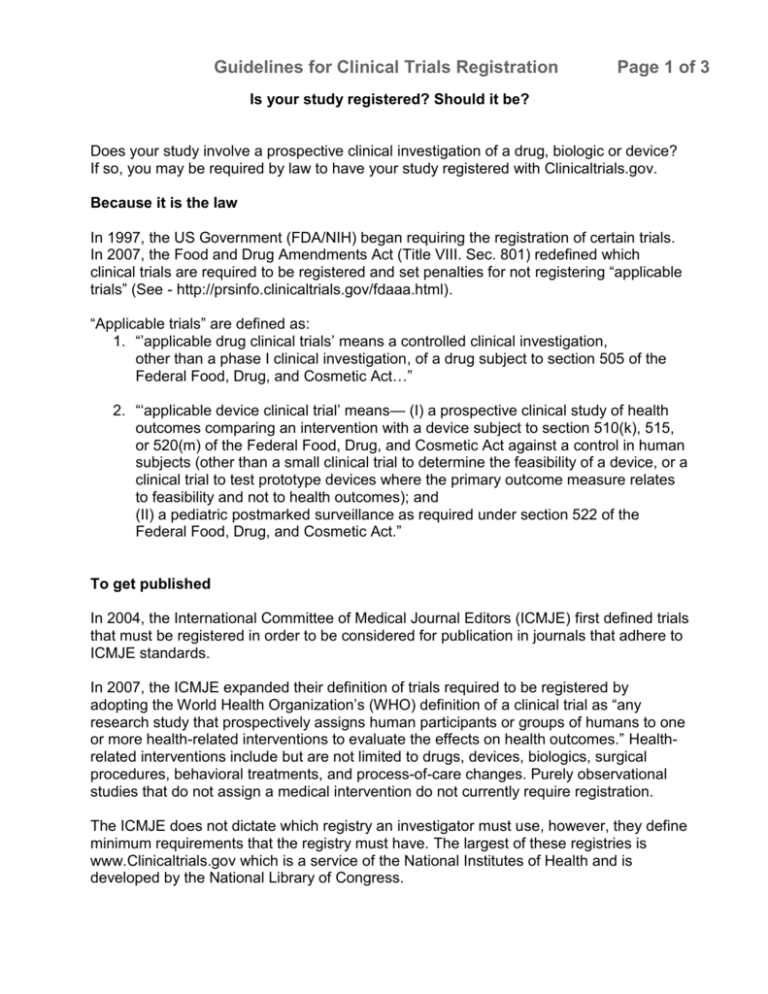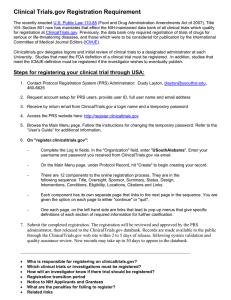Is your study registered? Should it be?
advertisement

Guidelines for Clinical Trials Registration Page 1 of 3 Is your study registered? Should it be? Does your study involve a prospective clinical investigation of a drug, biologic or device? If so, you may be required by law to have your study registered with Clinicaltrials.gov. Because it is the law In 1997, the US Government (FDA/NIH) began requiring the registration of certain trials. In 2007, the Food and Drug Amendments Act (Title VIII. Sec. 801) redefined which clinical trials are required to be registered and set penalties for not registering “applicable trials” (See - http://prsinfo.clinicaltrials.gov/fdaaa.html). “Applicable trials” are defined as: 1. “’applicable drug clinical trials’ means a controlled clinical investigation, other than a phase I clinical investigation, of a drug subject to section 505 of the Federal Food, Drug, and Cosmetic Act…” 2. “‘applicable device clinical trial’ means— (I) a prospective clinical study of health outcomes comparing an intervention with a device subject to section 510(k), 515, or 520(m) of the Federal Food, Drug, and Cosmetic Act against a control in human subjects (other than a small clinical trial to determine the feasibility of a device, or a clinical trial to test prototype devices where the primary outcome measure relates to feasibility and not to health outcomes); and (II) a pediatric postmarked surveillance as required under section 522 of the Federal Food, Drug, and Cosmetic Act.” To get published In 2004, the International Committee of Medical Journal Editors (ICMJE) first defined trials that must be registered in order to be considered for publication in journals that adhere to ICMJE standards. In 2007, the ICMJE expanded their definition of trials required to be registered by adopting the World Health Organization’s (WHO) definition of a clinical trial as “any research study that prospectively assigns human participants or groups of humans to one or more health-related interventions to evaluate the effects on health outcomes.” Healthrelated interventions include but are not limited to drugs, devices, biologics, surgical procedures, behavioral treatments, and process-of-care changes. Purely observational studies that do not assign a medical intervention do not currently require registration. The ICMJE does not dictate which registry an investigator must use, however, they define minimum requirements that the registry must have. The largest of these registries is www.Clinicaltrials.gov which is a service of the National Institutes of Health and is developed by the National Library of Congress. Guidelines for Clinical Trials Registration Page 2 of 3 What if I don’t register? The Food and Drug Amendment Act stated penalties may include civil monetary penalties up to $10,000 for failing to submit or for submitting fraudulent information to ClinicalTrials.gov. If the violation is not corrected within 30 days of notification of noncompliance, the fine may go up to $10,000 per day until resolved. Additional penalties may include the withholding or recovery of federal grant funds. Trials that are not registered will not be considered for publication in journals that adhere to ICMJE standards. Who should register? Clinical trials are normally registered by the sponsor. Therefore, industry sponsored trials are normally registered by the industry sponsor. Multi-center trials are should be registered by the “lead sponsor” so that the registry does not receive multiple registrations for the same trial. However, Investigator initiated trials should be registered by the Principal Investigator (PI). Additionally, investigator-initiated trials in which the investigator holds their own IND or IDE should be registered by the PI. Ultimately it is the PI’s responsibility that the trial be registered. Therefore, every PI should inquire whether the study is fully registered by the sponsor. How do I know if I need to register? If you are uncertain of whether to register your clinical trial, it is suggested err on the side of caution and register your trial. Acknowledgments Tanner, Stephanie L. (2008). Author Ali, Lynette A. (2008). Contributor to content References International Committee of Medical Journal Editors (ICMJE) - Uniform Requirements for Manuscripts Submitted to Biomedical Journals ClinicalTrials.gov - Protocol Registration System Guidelines for Clinical Trials Registration Page 3 of 3 The icmje.org website link below, under the heading number III - Publishing and Editorial Issues, has information related to publication in biomedical journals. ICMJE - Uniform Requirements for Manuscripts Submitted to Biomedical Journals The ClinicalTrials.gov Protocol Registration link below: Bullet point J – Obligation to Register Clinical Trials – has more information about registering clinical trials – paragraph 3 starts as - The ICMJE does not advocate one particular registry and goes on to explain in more details. ClinicalTrials.gov would be the best place to register any trials that meets the criteria as it is a public website, and would also serve the requirements for federally funded clinical trials registration as well. ClinicalTrials.gov - Protocol Registration System (PRS) Information Dr. Hayes, the Office of Research Compliance and Administrator’s (ORCA) Medical Director would have information you need to further assist you with clinical trials registration.











